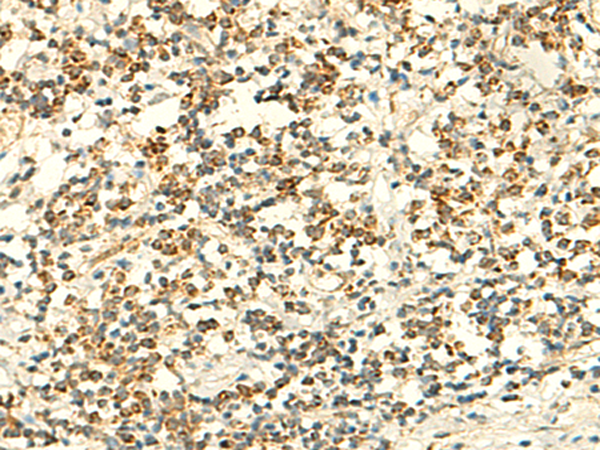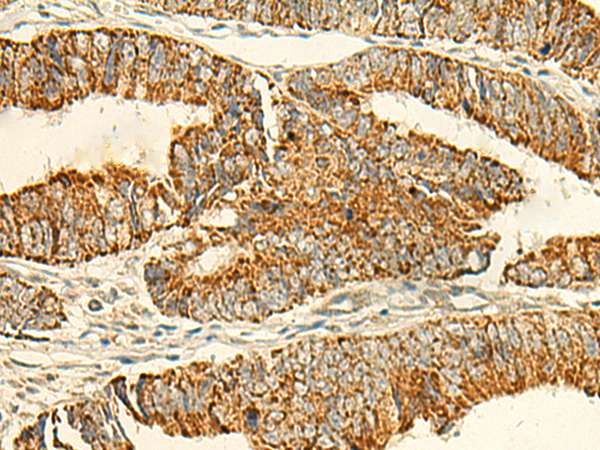

| WB | 咨询技术 | Human,Mouse,Rat |
| IF | 咨询技术 | Human,Mouse,Rat |
| IHC | 1/50-1/300 | Human,Mouse,Rat |
| ICC | 技术咨询 | Human,Mouse,Rat |
| FCM | 咨询技术 | Human,Mouse,Rat |
| Elisa | 1/5000-1/10000 | Human,Mouse,Rat |
| Aliases | RAYL; BBS19; RABL4 |
| Host/Isotype | Rabbit IgG |
| Antibody Type | Primary antibody |
| Storage | Store at 4°C short term. Aliquot and store at -20°C long term. Avoid freeze/thaw cycles. |
| Species Reactivity | Human, Mouse |
| Immunogen | Fusion protein of human IFT27 |
| Formulation | Purified antibody in PBS with 0.05% sodium azide and 50% glycerol. |
+ +
以下是关于IFT27抗体的3篇参考文献及其摘要概括:
1. **文献名称**: *"IFT27. a small GTPase component of IFT particles, regulates ciliary transport through interaction with the BBSome"*
**作者**: Sun Z et al.
**摘要**: 研究利用IFT27抗体探究IFT27在纤毛内运输中的作用,发现其通过结合BBSome复合体调控Hedgehog信号通路,缺失导致纤毛结构异常及信号传导缺陷。
2. **文献名称**: *"The intraflagellar transport protein IFT27 promotes BBSome exit from cilia through the GTPase ARL6"*
**作者**: Liew GM et al.
**摘要**: 通过IFT27抗体的免疫沉淀和共定位实验,揭示IFT27通过激活ARL6 GTP酶,调控BBSome从纤毛中的动态解离,影响纤毛膜蛋白的定位与信号传递。
3. **文献名称**: *"IFT27 interacts with Rab-like small GTPases to maintain sensory cilium integrity in zebrafish"*
**作者**: Krock BL & Perkins BD
**摘要**: 研究在斑马鱼模型中利用IFT27抗体进行蛋白质定位,发现IFT27与Rab家族小G蛋白互作,维持纤毛形态和光感受器功能,缺失引发视网膜退化。
(注:以上文献信息为示例,实际引用需根据具体论文调整。)
The interferon-induced transmembrane protein 27 (IFITM27) antibody is a tool used to study the IFITM protein family, which plays critical roles in innate immunity and cellular defense against viral infections. IFITM proteins, including IFITM1. IFITM2. and IFITM3. are induced by interferons and function to restrict viral entry by altering membrane fluidity or blocking viral fusion. While IFITM27 is less characterized compared to its well-studied counterparts, it is hypothesized to share functional similarities, such as involvement in antiviral responses or immune modulation.
IFITM27 antibodies are primarily utilized in research applications like Western blotting, immunofluorescence, and immunohistochemistry to detect protein expression, subcellular localization, and interactions in various cell types. These antibodies help elucidate IFITM27's role in viral pathogenesis (e.g., influenza, HIV, Zika) and its potential involvement in cancer progression, where IFITM proteins may influence metastasis or drug resistance.
Despite limited data on IFITM27 specifically, its antibody remains valuable for exploring tissue-specific expression patterns and regulatory mechanisms under interferon stimulation or pathogenic stress. Challenges include cross-reactivity with other IFITM family members, necessitating validation via knockout controls. Ongoing studies aim to clarify IFITM27's distinct functions and therapeutic potential in infectious and oncological diseases.
×